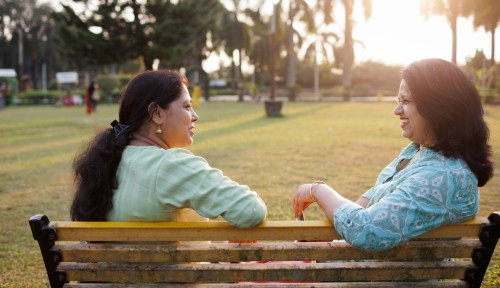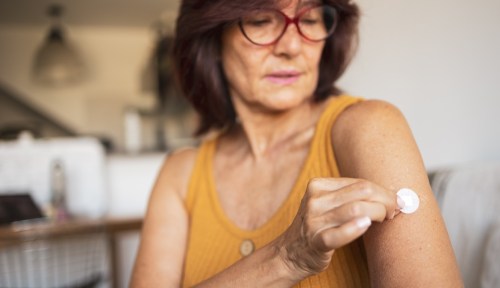Going With the Flow (or Not): How I Stay on the Road During Perimenopause
Hot flashes and erratic periods can make traveling tough. One travel writer shares her perimenopause travel tips and experiences.

I glanced at my phone’s calendar as I packed my suitcase, confirming it had been 41 days since the end of my last period. My previous three menstrual cycles had lasted between just 18 and 21 days.
Experts in This Article
OB/GYN and CEO and founder of Evora Women’s Health
owner of The Ultimate Retreat Company in Costa Blanca, Spain
My upcoming adventure included a fantastic week-long itinerary full of biking, hiking and culture stops in Colombia, a new-to-me country. I should have been thrilled. Instead, all I wanted to do was flop on the couch, eat salty carbs, and cry. I’d been fighting crushing PMS symptoms—cramping, massive mood swings, exhaustion, and achy joints—for a couple of weeks. Frustrated and cranky, I downed Advil, carved out precious carry-on room for two boxes of super-plus tampons, and tried to sleep before my 5 a.m. flight the next morning.
During the week-long trip, I traveled by bus for hours at a stretch between remote villages off the beaten path. As I visited incredible archaeological sites, met new people, and learned all about the history of Colombia, I also kept a tampon in the entire time for fear I might start hemorrhaging. I kept taking Advil so I could stick to my active, pre-planned itinerary without surrendering to persistent, painful cramping.I kept praying I wouldn’t have an embarrassing hot flash. And I kept wondering where the hell my period was.
It finally showed up on Day 48, just as I was making my way home.
Lovely.
I’m a freelance travel journalist. My love of exploring our wonderful world is a life-long passion. Solo journeys have shown me what I’m capable of, boosted my confidence, and given me a sense of well-being. Travel is the ultimate soul stretch, one I’m grateful to experience regularly.
I’m also perimenopausal. That means my ovarian function is slowly grinding to a halt, causing hormone swings that trigger a myriad of symptoms. In my case, that includes hot flashes, irritability, sleep disturbances, bloating, brain fog, joint pain and overly-sensitive skin. Menopause isn’t officially reached until you’ve gone without a period for 12 months, and the process of perimenopause can take years.
At 48, I’ve maneuvered around portions of perimenopause with a decent amount of grace. I’m at peace with my fleeting fertility. The gray hairs I’ve learned to keep, not cover. Any stray hairs I can easily pluck. Hormonal breakouts are annoying but manageable. But slogging through more severe side effects while keeping my globetrotting schedule has become increasingly disruptive.
In the past couple of years, I’ve experienced overwhelming nervousness while traveling. (Can I make my connection? Will I sleep on the plane? Where’s my passport?) Turns out, many people experience anxiety, sometimes for the first time in their lives, during perimenopause. There’s the waiting on my increasingly erratic periods, which often look and feel like crime scenes sometimes requiring both tampons and pads. Hot flashes leave me suddenly drenched. Night sweats disrupt my sleep and make jet lag unbearable. Several times, the resulting lack of rest has left me a brain-fogged mess when I should have been relishing a brand-new destination. I’m not alone: dear friends and fellow travel writers I commiserate with on the regular are also slogging through, trying to maintain their regular routines and activities as their physical and mental states are in hormonal revolt.
I never imagined that perimenopause could be so challenging and tumultuous. My mom never really brought it up, nor have any of my doctors so far. I’ve been muddling through without really knowing what, if anything, I can do about it. And it’s threatening to rob me of a tremendous joy—travel.
“Don’t let this stage in life press the pause button on living, loving life, and exploring.” —Julie Ann Slade, owner, The Ultimate Retreat Company
“We have done such a poor job of educating perimenopausal women,” explains Becky Lynn, MD, an OB/GYN, menopause expert, and founder/CEO of Evora Women’s Health, a medical concierge service focused on women’s wellness. “They might feel broken, and that’s just not the case. The good news is that there are a lot of safe and effective things that you can do to treat perimenopause.”
After conversations with patients focusing on medical history, individual symptoms, daily stressors and lifestyle, Dr. Lynn often prescribes a contraceptive—like the patch or vaginal ring—that can also double as an effective hormone replacement therapy (HRT) option. They deliver safe doses of hormones that regulate menstrual flow and can help quell a whole host of other perimenopause unpleasantries. “You don’t have to suffer in silence,” Dr. Lynn says. “There are ways to feel better.”
Outside of the doctor’s office, there are a lot of ways you can learn to manage or mitigate symptoms of perimenopause while you travel. Julie Ann Slade, owner of The Ultimate Retreat Company in Costa Blanca, Spain, arranges customized wellness and reset breaks for clients. Many are middle-aged and perimenopausal, venturing out solo. “Travel keeps us engaged with the world,” she tells me. “It keeps our bodies moving and our minds healthy with new experiences that feed our souls.”
Slade acknowledges hormonal travel concerns are very real. Her staff keeps in constant communication with in-transit guests to minimize any anxiety, difficulties, or snags, and works with them to tailor their experience according to their personal needs. This can include a menopause-specific medical and wellness consultation, customized meals, life coaching, and specific fitness offerings. Guests also have private rooms, with no single supplement, so they can enjoy peace and privacy. Aromatherapy sprays containing calming scents are readily available, and time outdoors is prioritized to boost mood.
Slade says emotional support is also vitally important to combat social stigma associated with perimenopause, as is staying active and engaged despite its changes and challenges. She and her staff actively listen to their perimenopausal guests, meet them where they are, and offer encouragement, support and practical solutions. The goal: to impart empathy, encouragement and empowerment.
I can’t imagine life without the thrill of going to new places and meeting new people. With so much change in my own body, travel is a constant that I crave.
“Don’t let this stage in life press the pause button on living, loving life, and exploring,” Slade says. “There are some amazing experiences out there waiting for you.”
I’ve learned through trial and error—as well as talking to others in the thick of perimenopause—how to navigate travel during this odd second puberty. Some of it involves embracing practicality, like wearing loose layers made from natural fabrics like bamboo or merino to better handle the random hot flash. I also always make sure to keep medications, a change of clothes (in case of a period leak or very intense sweats), and menstrual products in my carry-on within easy reach. (Cleansing wipes, in case you don’t have access to a shower for a while, are also key.)
Understanding your menopause symptom triggers is also important. Sugar, alcohol and caffeine can exacerbate symptoms, including sleep disruption, hot flashes and mood swings. Many of my friends have cut out all three and swear it’s made them feel so much better; I’m still working on it! Focused breathing can lower anxiety and mood swings associated with perimenopause. I use my Calm app religiously on the road; it helps me refocus and recenter when a new place threatens to throw me into overwhelm. And when all else fails, talk to your medical provider about options to help manage perimenopause symptoms.
There’s no predicting when perimenopause symptoms will hit, how intense they’ll be, or how long they will last. Each of us has their own threshold for discomfort, and addressing it is highly personal. I’ll continue to navigate through it, advocate for myself with my care team, make the treatment choices that are right for me, and of course, compare notes with my dear friends who are also on the same hormonal rollercoaster.
Here’s the thing: I can’t imagine life without the thrill of going to new places and meeting new people. With so much change in my own body, travel is a constant that I crave. While it’s become more difficult and draining at times, I know it’s more important than ever to keep getting out there, perhaps not just in spite of, but *because* of perimenopause. I need the connections, personal growth, and feeling of satisfaction being out in the world brings, as I balance this time of physical and mental transition. So I’ll keep at it, giving myself plenty of grace and patience packed for good measure.
Whether my period shows up, or not.
Sign Up for Our Daily Newsletter
Get all the latest in wellness, trends, food, fitness, beauty, and more delivered right to your inbox.
Got it, you've been added to our email list.










